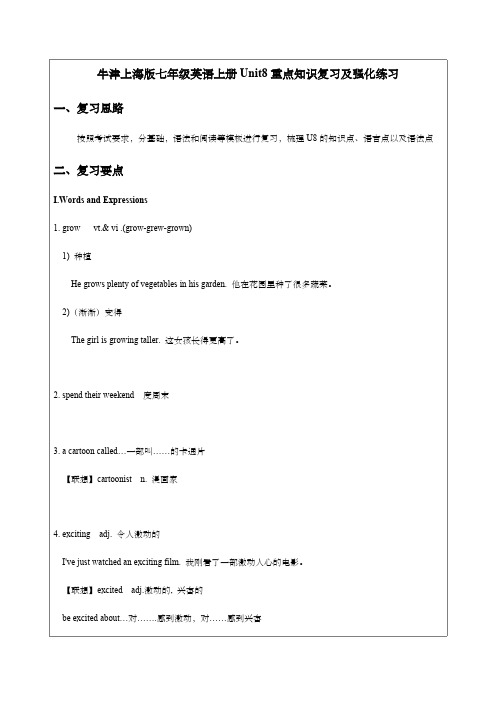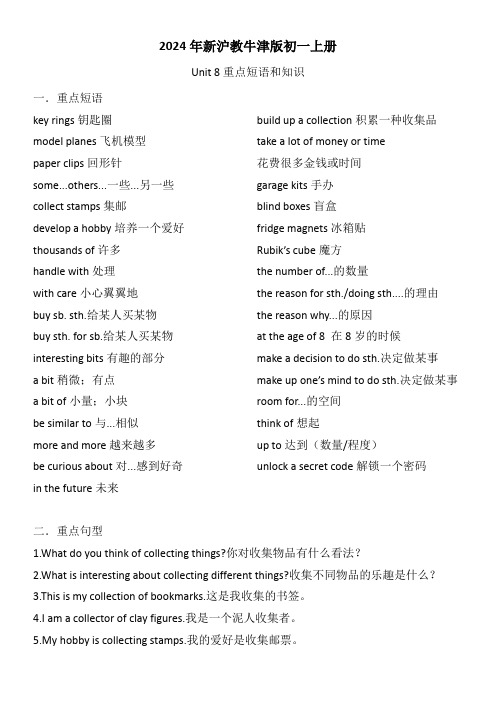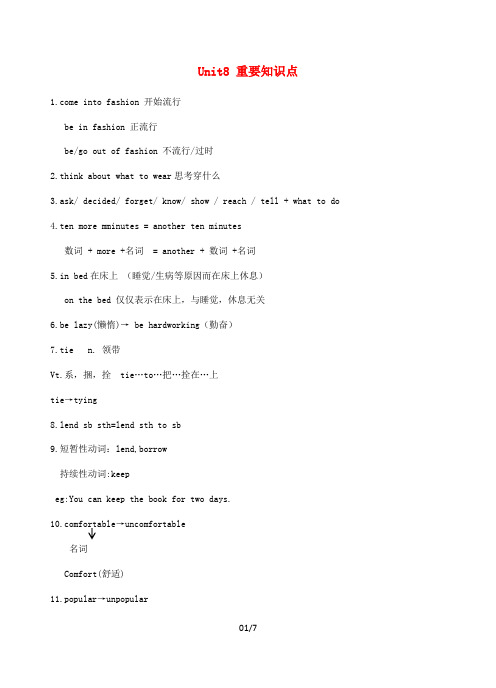新版上海牛津版七年级上册unit8知识点
牛津上海版七年级英语上册Unit8重点知识复习及强化练习

The children were excited about their Christmas presents. 孩子们对他们的圣诞礼物感到兴奋。
5. interesting adj.有趣的,令人感兴趣的That's a very interesting question. 那是一个很有趣的问题。
【联想】interested adj.有兴趣的,感兴趣的be interested in… 对….感兴趣I’m interested in birds. 我对鸟兴趣。
6. an information sheet一张信息表注意:information是不可数名词。
【联想】an information board一块信息牌7. Health Camp健康度假营【联想】go camping去野营8. regularly adv. 有规律地;经常地;定期地I like playing badminton regularly. 我喜欢经常打羽毛球。
9. get up起床go to bed去睡觉go to bed early and get up early早睡早起10. at least至少,最起码【反义】at most至多11.请注意区别:1) too much+不可数名词I don't have too much time.我没有太多时间。
2) too many+可数名词复数She eats too many sweets.她吃了太多的糖果。
3) much too+形容词或副词The garden is much too beautiful.这个花园太漂亮了。
12. have a sore throat喉咙痛have toothache牙疼have a stomach ache/stomachache 胃痛13. hurt (hurt-hurt-hurt)1) vi. 疼痛My tooth hurts.我牙疼。
牛津上海版七年级英语上册Unit8知识点汇总

牛津上海版七年级英语上册Unit8知识点汇总Unit8 Growing healthy, growing strongI 词组:1.diet and health 饮食和健康2. grow healthy 长得健康3. grow strong 长得健壮4. spend one’s weekend 过周末5.at Health Camp 在健康度假营6.go swimming 去游泳7.in the swimming pool 在游泳池里8.Neither do I. 我也不9.So do I. 我也是10.play badminton 打羽毛球11.read magazines 读杂志12.in the reading room 在阅览室13.in the hall 在大厅里14.a cartoon called…. 一部名为……的卡通片15.exciting and interesting 既激动又有趣16.That's a good idea. 那真是个好主意17.an outing 一次远足18.an information sheet 一张信息纸19.in the camp 在度假营里20.stay healthy and strong 保持健康和强壮21.to be a healthy child 做一个健康的孩子22.go to bed early 早睡23.get up early 早起24.exercise regularly 定期锻炼25.at least 至少26.eight glasses of water 八杯水27.too much sweet food 太多的甜食28.too many soft drinks 太多的软饮料29.good/ bad habits 好/坏习惯30.have a sore throat 喉咙痛31.have toothache 牙痛32.have a stomach ache 胃痛st Sunday 上周日34.three packets of crisps 三包薯片35.two boxes of ice cream 两盒冰淇凌36.some vegetables 一些蔬菜37.four bars of chocolate 四块巧克力38.three bottles of lemonade 三杯柠檬汁39.a lot of fried food 许多油炸食品40.enough fruit 足够的水果41.watch less TV 少看电视42.eat fewer crisps 少吃薯片43.eat more fruit 多吃水果44.change my bad habits 改变我的坏习惯ed to do sth. 过去常常做某事46.not… any longer. 不再47.do a lot of exercise regularly 有规律地做许多的运动48.study hard 努力学习49.in the past 在过去II. 词性转换:1. health n. 健康healthy a. 健康的unhealthy a. 不健康的2. call v. 叫喊;呼唤;打电话called a. 被叫做……的,名为……的3. regularly adv. 有规律地;正常地regular adj. 有规律的;正常的irregularly adv. 无规律地;不正常地irregular adj. 无规律的;不正常的4. many/much adj./ pron. 许多的/许多more adj./ pron. 更多的/更多5. few adj. 少数的;几乎没有的fewer adj. 较少的pron. 少数;几乎没有pron. 较少6. little adj. 少的less adj.较少的adv.少adv.较少地n. 没有多少n. 更少的数7. change v. 变化,交换change n. 变化;零钱changeable adj. 易变的,不定的8. suggestion n. 建议suggest v. 建议9 exciting adj.令人激动的excited 感到激动的10 interesting interestedInteresting places= places of interest be interested inIII. 语言点/句型:1.Mr Hu and the students are spending their weekend at Health Camp. 胡老师和学生在健康营度周末。
七上英语第八单元笔记

七上英语第八单元笔记
以下是七上英语第八单元的一些重点笔记:
1. 重点单词和短语:学习并掌握本单元的生词,如“key”、“lost”、“found”等,以及一些常用的短语,如“in English”、“call sb. at+电话号码”等。
2. 重点语法:掌握形容词性物主代词的用法,了解其与名词性物主代词的区别。
3. 课文内容:理解并掌握本单元课文所讲述的故事情节,重点掌握课文中的细节描述和语言表达方式。
4. 练习巩固:完成本单元的练习题,包括词汇、语法、阅读理解和写作等,通过练习巩固所学知识。
5. 日常应用:将所学的词汇、短语和语法知识应用到实际生活中,如给别人打电话时使用适当的语言等。
请注意,以上仅为大致框架,具体内容可能因教材版本和教师实际教学情况而有所不同。
建议根据实际情况进行补充和调整。
牛津沪教版七年级上英语unit8重点词汇及语法的用法(无答案)

七年级上unit8重点词汇及语法的用法(一)上次课课后巩固作业处理,建议让学生互批互改,个别错题可以让学生进行分享,针对共性的错题教师讲解为主。
知识点一(词汇)1. neither ['naiðə, 'ni:ðə] adv. 也不【提示】neither的用法小结如下:1) neither作为副词表示“也不”,常用于倒装句的开头,紧跟在一个否定句后面。
如:——John can’t swim. 约翰不会游泳。
——Neither can I. 我也不会。
2)neither用作代词,表示“两者都不;双方均不”。
如:He answered neither of the letters. 两封信他都没有回。
3)neither用作连词,常用短语为“neither...nor...,表示既不……也不……”。
如;Neither he nor I am well educated. 我和他都没有受过良好的教育。
都(肯定)搭配都不(否定)搭配两者Both (…and…) Neither (…nor…) 三者或三者以上All of None of2. cartoon [kɑ:'tu:n] n. 动画片;卡通片【词性转换】cartoonist [kɑ:'tu:nist] n. 漫画家This is one of the most vivid cartoons I have ever seen. 这是我所见过的最生动的漫画之一。
3. war [wɔ:] n. 战争【近义词】battle ['bætl] n. 战斗【反义词】peace [pi:s] n. 和平We have had two world wars last century. 上世纪我们已经经历了两次世界大战。
4. outing n. (集体)出外游玩;远足【记忆】go on an outing 外出游玩The students of Class 7B will go on an outing to the zoo. 七年级二班的同学将要到动物园去游玩。
沪教牛津版英语七年级上册知识点总结

Unit 11来自be from=come from2和...住在一起live with...3靠近.. close to=near4艺术老师an Art teacher5姐姐an elder sister6乘车上学go to school by bus / take a bus to school7 擅长be good at doing sth. = do well in doing sth.8交朋友make friends with...9来自世界各地的朋友people from all over the world =around10 发邮件给某人email sb.11 离...很远far away from....12 .....的意思是the meaning of . (13)在某人的空余时间in one’s free time14 …的答案是the answer to …15 一个德国女孩a German girl16 在互联网上on the Internet17 放风筝fly a kite / fly kites18 收到某人来信hear from sb= receive / get a letter from19 最美好祝愿best wishes20 许多朋友a lot of / lots of / many friends21 洗澡take a bath22 想做某事would like to = want to … 23 你多大了?What’s your age?/ How old are you?24 完成complete=finish4. work as + 职位名称作为…而工作6. walk to school=go to school on foot 走路去上学7. be keen on (doing) sth=be interested in 对….感兴趣8. enjoy (doing) sth= like doing sth 喜欢做某事9. reply to sb回信给某人11. a photo of 一张…的图片13. speak Chinese 说中文15. in the middle 在中间20. write to sb写信给某人,注意pay attention to 以…开始begin with 参考书reference book语法1:特殊疑问词及其引导的特殊疑问句(what, where, when, how, why, which)What refers to things.对事物提问(什么)(可以用来询问职业) Where refers to places.对地点提问(在哪里)Who refers to persons.对人提问(谁)How refers to ways.对年龄提问(多大年纪,几岁)How old refers to ages.对某人或情况提问(怎么样)When refers to times.对时间提问(何时)what time (只能用来问具体几点钟)Why refers to reasons.对原因提问(为什么)which refers to kinds (种类).对事物或人称提问(哪一个,哪一位)How many refers numbers.对数量提问(多少)How old ...多大年纪How often ... 多经常,多久一次How far... 多远How long ... 多长时间How soon 多快,多语法2:不定冠词的用法不定冠词有a和an两个,仅用在单数可数名词前。
沪教牛津版七年级英语上册 词组 Unit 8

Unit 8 Collecting Things1.collecting things 收集,收藏2.model plane 飞机模型3.phone card 电话卡4.make a list of 列个清单5.a collection of 大量的6.living room 起居室7.lots of/a lot of 很多,大量的8.There was hardly any space. 几乎没有空间。
9.free time 闲暇时间10.spend …doing…. 花时间做…11.in a short time 过一小会儿12.all over the area 整个这个地区13.follow me 跟我来14.keep one’s eyes open 睁着眼15.be sure 肯定16.refer to 指17.a waste of time 浪费时间18.be interested in 对…感兴趣19.think of 认为、考虑20.in front of 在…前面21.take place 发生22.need to do…需要做…23.two years ago 两年前24.by boat 乘船25.work of art 艺术作品26.be bad for…. 对…不好27.each other 相互28.Show and Tell Day 展示和讲述日29.as a result (of) 结果…30.carry out 实现Unit 8 Collecting Things1.收集,收藏2.飞机模型3.电话卡4.列个清单5.大量的6.起居室7.很多,大量的8.几乎没有空间。
9.闲暇时间10.花时间做…11.过一小会儿12.整个这个地区13.跟我来14.睁着眼15.肯定16.指17.浪费时间18.对…感兴趣19.认为、考虑20.在…前面21.发生22.需要做…23.两年前24.乘船25.艺术作品26.对…不好27.相互28.展示和讲述日29.结果…30.实现。
2024年沪教牛津版七年级英语上册 Unit8重点短语和知识及语法练习

2024年新沪教牛津版初一上册Unit 8重点短语和知识一.重点短语key rings钥匙圈model planes飞机模型paper clips回形针some...others...一些...另一些collect stamps集邮develop a hobby培养一个爱好thousands of许多handle with处理with care小心翼翼地buy sb. sth.给某人买某物buy sth. for sb.给某人买某物interesting bits有趣的部分a bit稍微;有点a bit of小量;小块be similar to与...相似more and more越来越多be curious about对...感到好奇in the future未来build up a collection积累一种收集品take a lot of money or time花费很多金钱或时间garage kits手办blind boxes盲盒fridge magnets冰箱贴Rubik’s cube魔方the number of...的数量the reason for sth./doing sth....的理由the reason why...的原因at the age of 8 在8岁的时候make a decision to do sth.决定做某事make up one’s mind to do sth.决定做某事room for...的空间think of想起up to达到(数量/程度)unlock a secret code解锁一个密码二.重点句型1.What do you think of collecting things?你对收集物品有什么看法?2.What is interesting about collecting different things?收集不同物品的乐趣是什么?3.This is my collection of bookmarks.这是我收集的书签。
七年英语上册Unit8Fashion重要知识点新版牛津版

Unit8 重要知识点e into fashion 开始流行be in fashion 正流行be/go out of fashion 不流行/过时2.think about what to wear思考穿什么3.ask/ decided/ forget/ know/ show / reach / tell + what to do4.ten more mminutes = another ten minutes数词 + more +名词 = another + 数词 +名词5.in bed在床上(睡觉/生病等原因而在床上休息)on the bed 仅仅表示在床上,与睡觉,休息无关6.be lazy(懒惰)→ be hardworking(勤奋)7.tie n. 领带Vt.系,捆,拴 tie…to…把…拴在…上tie→tying8.lend sb sth=lend sth to sb9.短暂性动词:lend,borrow持续性动词:keepeg:You can keep the book for two days.fortable→uncomfortable名词Comfort(舒适)11.popular→unpopularbe popular with sb.受某人的欢迎Popular music流行音乐Popular culture 流行文化12.smart adj. 衣冠楚楚的,衣着讲究的,精神的adj. 聪明的,伶俐的 = clever13.cool adj.酷的adj.凉爽的→warm 温暖的14.a yellow cotton blouses一件黄色的棉质女士衬衫当名词前有多个定语修饰时,顺序按“描绘性形容词(beautiful,big)---大,小,长,短类---形状类(round)---颜色类---国籍类(Chinese,English)---材料类”two good big round black French wooden tables 两张优质的原形黑色法国的桌子15.cotton n.棉花,棉(不可数名词)常用来指东西的质地,原料(wool羊毛 leather皮革 silk 丝绸)16.both of + n.(复数) / 复数代词的宾格后面的谓语动词用复数形式both A and B 两者都,不仅……而且……后面的谓语动词用复数形式17.That’s all for…………到此结束Eg: That’s all for today’s class.今天的课到此结束18.be made of 由……制成(看得出原材料)be made from 由……制成(看不出原材料)be made in +地点产于某地be made by sb. 由某人制作而成19.shirt.=Thereat in your black shirt.=The black shirt looks great on you.“某人+look(s)+形容词+in+颜色/衣服”某人穿……看起来……(样)= “衣服+look(s)+形容词+on+sb.”20. lie vi.躺 ; 说谎n. 谎言(复数:lies)21.write a letter to sb. = write sb. a letter =write to sb. 写信给某人22.hear from sb.收到某人的来信23.waitsb./sth.sb./sth.等待某人/某物wait for sb. to do sth.等待某人做某事Can’t wait to do sth.迫不及待做某事24.have to do sth. 不得不做某事25.What do you think of…?你觉得/认为……怎么样=How do you like……?26.model 模型;模特作“模型”用时,常与车辆,飞机等连用,表示“……模型”27.design vt. 设计 n. the design of…………的设 designer n.设计师28.any other colourany other + 单数名词其他任何……29.dark 深色的 light浅色的黑暗的 bright 明亮的30.……includes…… = ,including……包括31.现在进行时:现在进行时表示正在发生或进行的动作(be+动词ing〔现在分词〕)一、句型结构二、现在进行时的用法。
- 1、下载文档前请自行甄别文档内容的完整性,平台不提供额外的编辑、内容补充、找答案等附加服务。
- 2、"仅部分预览"的文档,不可在线预览部分如存在完整性等问题,可反馈申请退款(可完整预览的文档不适用该条件!)。
- 3、如文档侵犯您的权益,请联系客服反馈,我们会尽快为您处理(人工客服工作时间:9:00-18:30)。
新版上海牛津版七年级上册unit8知识点一、知识点1. Read a story about people who collect unusual things.collect及物动词,意为“”翻译:你喜欢收集邮票吗?其名词形式为,意为“”;collector名词,意为“”.unusual形容词,“”,反义词是翻译:这是一本不同寻常的书。
下列词的否定形式分别是:happy— , healthy— , important—2. Listen to an interview about people’s collections.interview此处作名词,意为“”,还可作动词“”。
翻译:昨晚杰克在电视上接受了采访。
我要去采访获胜者们。
3.模型飞机汽车模型船模;航模xx卡4. There are eight doorbells on their front door!(1)Doorbell名词,意为“”,是个合成词,由“door+bell ”构成,合成词是一种重要的构词法。
如:黑板,教室,同班同学,(外)祖父母(2)front形容词,意为“前面的”。
翻译:这是我们的前花园。
翻译:凯西正坐在汽车的前座,而她的朋友玛丽站在汽车的前面。
(3) “前门”,“后门”。
5. “This silver doorbell is my favorite(favorite),”said Helen.silver形容词,意为“”,名词意为“”。
例如:她头上没有一根银发。
favorite也作favorite,意为“”,是可数名词。
翻译:这个节目已赢得了年轻人的喜爱。
6. e in, my dear grandson and granddaughter!grandson名词,意为“”。
祖父母是7.I like collecting newspaper.我喜欢收藏报纸。
newspaper可数名词,意为“”;news不可数名词,意为“”翻译:My father reads newspapers every day.Is there anything important in today’s newspaper?8. They went inside and saw newspapers everywhere.go inside意为“”,这里的inside相当于into the room,反义词是everywhere副词,意为“”翻译:请进来吧。
虽然我到处找了我的铅笔,但我还是找不到。
8.“Hello children!” called Grandma. “Let’s have some tea.”本句中的动词call意为“喊,嚷”。
如:“Breakfast is ready,”she called.此外,call还有如下含义: a boy called= a boy(1)取名,把……叫作翻译:他们把这个宝宝叫做西蒙。
(2)打xx翻译:我随后xx叫你。
(3)请……来翻译:他如此虚弱以至于我们不得不叫医生过来。
Let’s意为“让我们”,后接动词原形,常用于提出建议。
make/have/let sb. do sth.Let’s do sth. = .= .Let’s have dinner together next week.=The children followed her into the living room and saw lots of toys there.follow及物动词,意为“”=go after, lots of =例如: I followed her up the stairs. Spring follows winter.follow…into…意为“”翻译:警察跟随着小偷进了房间。
living room意为“”I enjoy reading in the sofa in the living room.11. There was hardly any space for the children to sit down.(1)hardly副词,意为“”。
翻译:我几乎不认识他。
no=not any, hardly any= 句中有hardly时,其反义疑问句的疑问部分应该用形式。
He can hardly speak Chinese, can he?both可以作形容词、代词或副词,意思是“”。
在句中可作主语、宾语或同位语。
both…and两者都Both are right. I like both.(1)both与动词连用时,一般放在系动词be之后,或其他动词之前。
翻译:他的父母都是工人。
他们俩都喜欢阅读。
(2)both可与and构成并列连词,连接两个性质相同并在句中作相同成分的并列结构。
例如:(1).他和他的哥哥都对英语很在行。
(2).玛丽又美丽又善良。
13. You have your school work to do, so you shouldn’t spend too much time collecting things.school work指学校布置的各种作业,包括“回家作业(homework)”,也包括“课堂作业”should情态动词,意为“”,表示义务、责任,用于各种人称。
翻译:在睡觉前你应该刷牙。
(1)I drank beer last night.(2)You have given me .(3)I am afraid this camera is expensive.(4)My wife is busy to see visitors.spend:使用spend时,主语只能是表示人的名词或代词。
翻译:安迪在图书上花了很多钱。
常用的句型:人+spend+ some money/ some time .人+spend+ some money/ some time .此外,spend还有“度过”的意思。
翻译:凯蒂每天在家庭作业上花费2小时。
他们买这个LED电视花费了4450元。
14. My friend will e to visit me in a short time from now.in a short time意为“很短时间后”。
“in+一段时间”表示“多长时间以后”,常用于一般将来时,对“in+一段时间”提问时用how soon.I will be back in two days.翻译:———你多久回来?—一周后。
2. something某事;某物There is something under the table. What is it?(1)something作主语时,谓语动词要用第三人称单数,例如:他的车子有些毛病Something is wrong with his bike.(2)形容词修饰something时要放在它的后面,如:I have something important to tell you.(3)something一般用于肯定句中,但也可用于征求意见并希望得到肯定回答的疑问句中。
例如:would you like something to eat?你想吃点什么吗?5. My teacher told me it’s bad for the environment.我的老师告诉我它对环境有害。
be bad for意为“对……有害的”,其反义词组是be good for,“对……有好处的,对……有利的”。
其中be动词有人称和数的变化。
be good to=be kind to=be friendly to 对……友好的例如:(1)It is bad for your eyes.它对你的眼睛有伤害。
(2)Eating too many hamburgers is bad for you.吃太多汉堡对你有害。
(3)Eating too many sweets is bad for your teeth.吃太多甜食对你的牙齿有害。
6. I’m happy he’s interested in something.我很高兴他对某样东西感兴趣。
be interested in意为“对……感兴趣”,后接名词、代词、动名词。
例如:Are you interested in collecting stamps? 你对收集邮票感兴趣吗?I’m interested in sports. 我对运动感兴趣。
7.What do you think of it?What do you think of…?意为“你认为……怎么样”用来询问对某人或某事(物)的看法,后接名词、代词或动名词。
例如:(1)What do you think of the film?你觉得这个电影如何?(2)What do you think of going out for a walk?你觉得出去散散步怎么样?注:How do you like…?意思也是“你认为……怎么样?”How do you like the novel?= What do you think of the novel?11. Do you collect anything? 你收藏东西吗?anything不定代词,意为“某事,某物;任何东西,任何事物”,一般用于否定句或疑问句中,在肯定句中一般用something.例如:Is there anything in the box? 盒子里有什么东西吗?You cannot believe anything she says. 你不能相信她说的。
I have something to say. 我有些事要跟你说。
I’m so hungry that I could eat anything. 我太饿了,吃什么都行。
anything用于肯定句时,只能表示“任何事物;任何东西”12.I started two years ago.我在两年前开始的。
ago副词,意为“以前”,表示从现在算起的“以前”,常和一般过去时态连用。
例如:I came here two years ago.我两年前来到这儿。
He arrived three hours ago.他3个小时前到了这里。
15.Some show great works of art. 一些展示了伟大的艺术作品。
work为可数名词时,意为“作品”,常用复数形式。
Work也可用作不可数名词,意为“工作”。
works of art意为“(绘画、雕塑等)艺术作品”例如:Do you like these works of art?你喜欢这些艺术作品吗?21. As a result, they make new friends and learn about the cultures and history of differentcountries.结果,他们结交了新朋友,并了解了不同国家的文化和历史。
